Other Speaking Situations & Occasions Resources
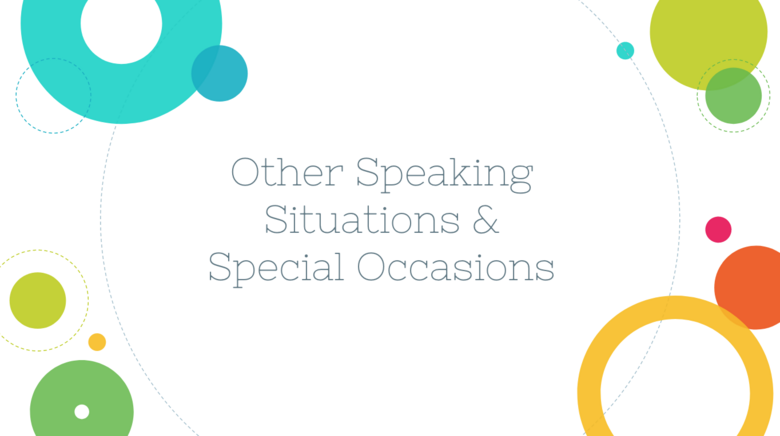
Overview
Have you ever thought to yourself, “Ugh, Public Speaking?! Why do I have to take that class, I’m never going to use it!” It’s true, many of us may never give a graduation address, a keynote presentation, or political campaign stump speech, but the fact is, all of us will, at some point in our lives, be in a situation that calls for us to speak in front of a group of people. This topic is designed to help you identify what those other speaking situations may be, and will offer information on how to make the most of everything from an impromptu toast at an intimate party to a high-stakes business presentation in the boardroom. We will use the term “other speaking situations” as a way to distinguish between what you will encounter in your Public Speaking class and what you will encounter in social or professional contexts.
First, this section will compare and contrast other speaking situations and formal rhetorical conventions you would find in a typical informative or persuasive speech. This section will examine specific types of speaking contexts and will demonstrate strategies for preparing, supporting, and delivering each. Finally, this section will address ways to maximize your communication effectiveness in challenging contexts such as online presentations, group projects, or highly emotional settings.
Learning Objectives
Upon completing this section, students should be able to:
- Articulate the social and rhetorical differences between “formal” presentations and other public speaking contexts
- Prepare and present speeches that are appropriate to different types of special occasions (e.g., toasts, eulogies, awards)
- Develop strategies for preparing and delivering business and professional presentations
- Understand the unique preparation, delivery, and technology needs associated with online presentations
- Effectively navigate speeches that require multiple presenters (e.g., panels, group presentations)
- Confidently manage the preparation and delivery of speeches in other college classes
(This Module meets the TAG/OCM 013 for a Public Speaking Course; Learning Outcome 2)
Recommended Textbook Resources
Stand up, Speak out: The Practice and Ethics of Public Speaking 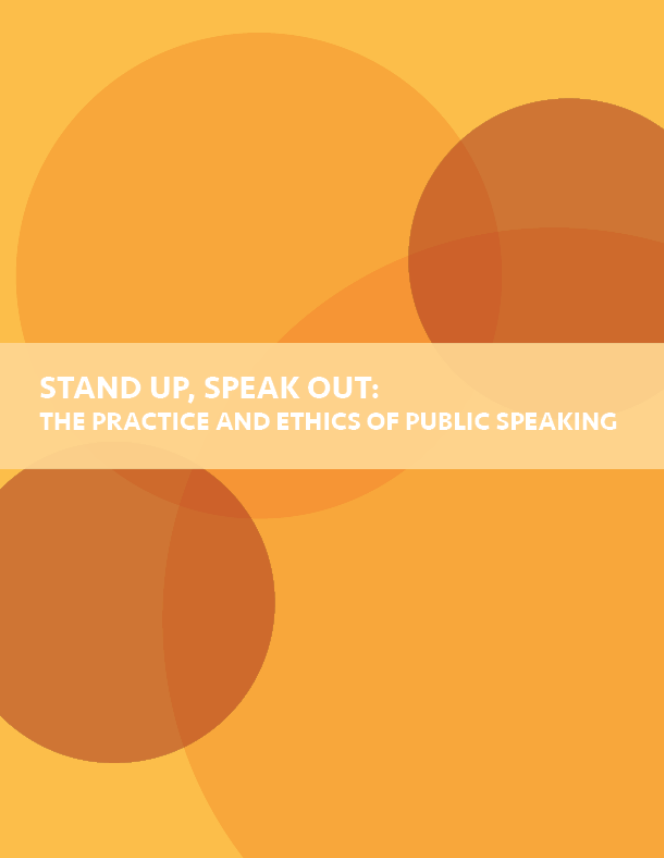
Chapter 18: Speaking to Entertain
18.1 Understanding Entertaining Speeches
18.2 Special-Occasion Speeches
18.3 Keynote Speaking
For additional support for other speaking contexts, refer (back) to the following chapters of Stand Up Speak Out:
Chapter 3: Speaking Confidently
Chapter 5: Audience Analysis
Chapter 14: Delivering the Speech
Exploring Public Speaking, 3rd. Ed.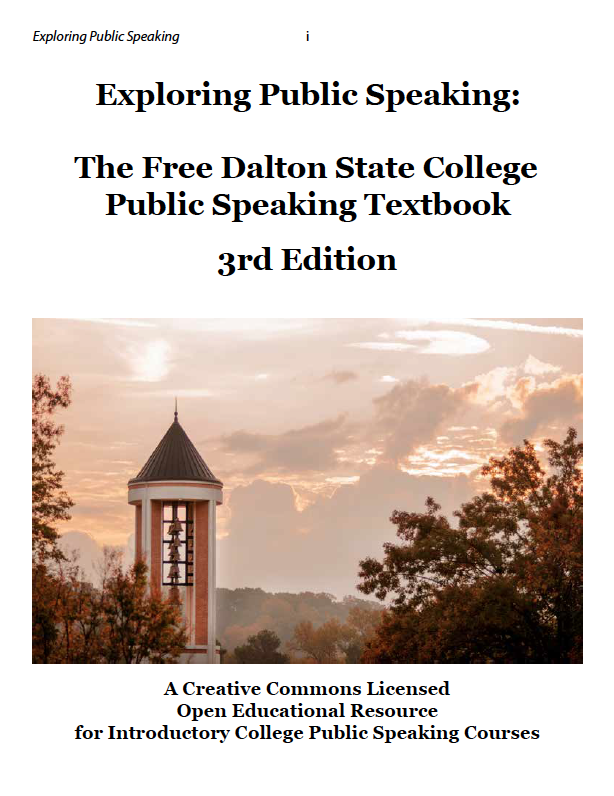
This textbook is available in multiple formats from the publisher’s website. Click the link above to access various options including downloading a PDF, ePub & Kindle formats, or individual chapter downloads.
Chapter 15: Special Occasion Speaking
- 15.1 Understanding Special Occasion Speeches
- 15.2 Types of Special Occasion Speeches
- 15.3 Special Occasion Language
- 15.4 Special Occasion Delivery
These chapters touch on the most important aspects of speaking in social and professional contexts. The material aligns very closely (if not exactly) with the OCM/SLO for this section. It was selected by the team for its clear, engaging language; thorough supporting sources from some of the leading scholars in the field; and of course, the publisher’s commitment to open educational resources.
Stand up, Speak out: The Practice and Ethics of Public Speaking 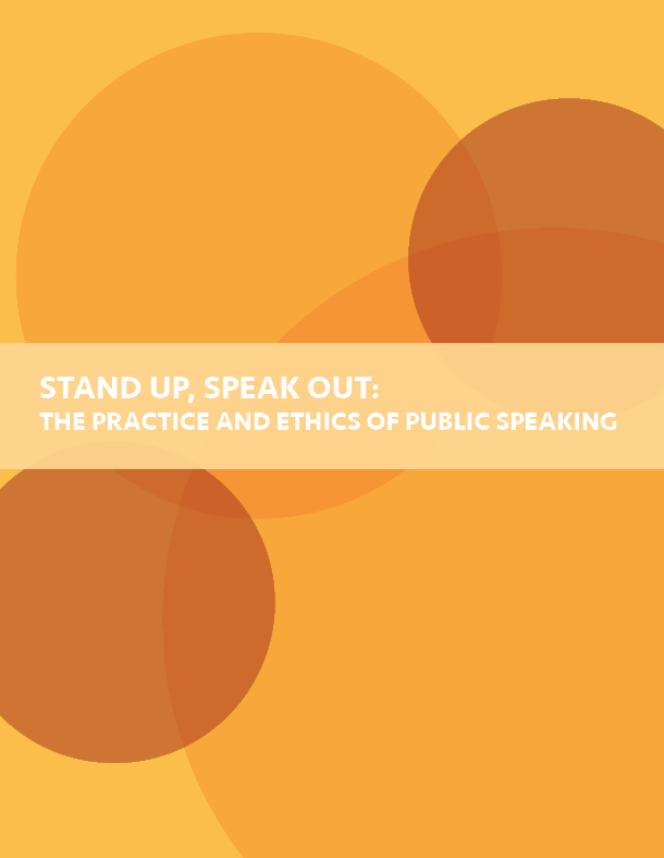
Chapter 18: Speaking to Entertain
18.1 Understanding Entertaining Speeches
18.2 Special-Occasion Speeches
18.3 Keynote Speaking
For additional support for other speaking contexts, refer (back) to the following chapters of Stand Up Speak Out:
Chapter 3: Speaking Confidently
Chapter 5: Audience Analysis
Chapter 14: Delivering the Speech
Exploring Public Speaking, 3rd. Ed.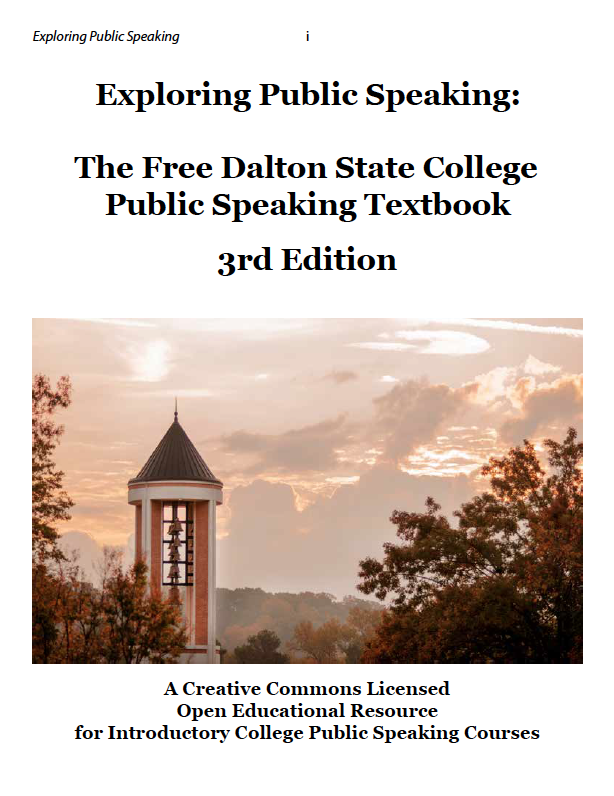
This textbook is available in multiple formats from the publisher’s website. Click the link above to access various options including downloading a PDF, ePub & Kindle formats, or individual chapter downloads.
Chapter 15: Special Occasion Speaking
- 15.1 Understanding Special Occasion Speeches
- 15.2 Types of Special Occasion Speeches
- 15.3 Special Occasion Language
- 15.4 Special Occasion Delivery
These chapters touch on the most important aspects of speaking in social and professional contexts. The material aligns very closely (if not exactly) with the OCM/SLO for this section. It was selected by the team for its clear, engaging language; thorough supporting sources from some of the leading scholars in the field; and of course, the publisher’s commitment to open educational resources.
Supplemental Content/Alternative Resources
Resources on Toasts:
How to Give a Toast
Toastmasters International
Giving the Perfect Toast
Denver Center for the Performing Arts
Motivational Speech Resources
Admiral McRaven addresses the University of Texas at Austin Class of 2014
The University of Texas at Austin
Ellen DeGeneres Commencement Speech at Tulane
TheEllenShow
Speech Breakdown: The Most Inspiring Speech (Rick Rigsby)
The Speaker Lab
PowerPoint Slides
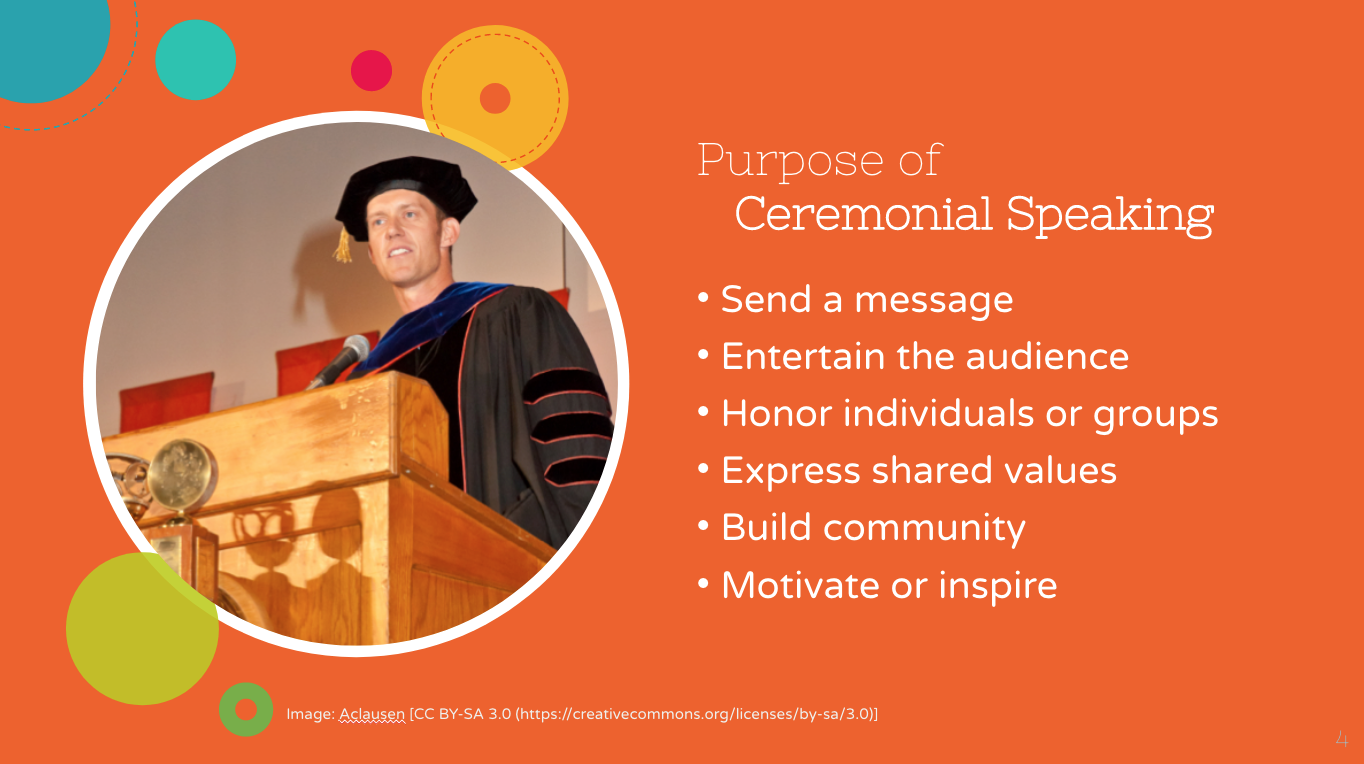
Topic Application Section
SPECIAL OCCASION SPEAKING EXERCISES
Students should be divided into groups of three or four, and each student is assigned one of the following types of special occasion speeches to deliver. They are encouraged to use other members of the group as the target or inspiration for the speech; that is, they might interview a classmate in order to discover information that would be useful for a toast or memorial speech about the individual. This helps to anchor the speech in a real-world context.
Eulogies / Memorials
Perhaps the most difficult speech you may ever have to give… a speech to commemorate a lost loved one. Pretend that a member of your group has recently passed away, and their family has asked you to speak at a memorial service. After doing some research about the individual (of course, you can interview them), prepare a 2-3 minute commemorative speech to honor them: their lives, their contributions to society, admirable personality traits, and/or notable accomplishments. Pay particular attention to solemn, tactful delivery.
Farewell Address
No one likes to say "good-bye," but it's a part of life. Whether you're graduating, changing jobs, or retiring many years from now, you may be called on to give a speech of farewell to your colleagues. We often see athletes do this when they retire from their teams... consider this your opportunity to look back on the experience, acknowledge memorable aspects of it, and perhaps thank your colleagues for being a part of your experience. Pretend you're a famous athlete, celebrity, or CEO retiring from your position. Prepare a 2-3 minute farewell address that you might give at a special event.
Awards
At some point in life, you high-achieving scholars will undoubtedly receive some sort of award or recognition…now’s your time to practice giving and receiving these honors! Invent some great award and prepare a 2-3 minute speech bestowing the honor on one of your groupmates (make sure to get their permission). Tell us why your award is meaningful and what your classmate did to deserve the honor.
Toasts
Select a member (or members) of your group and prepare a 2-3 minute “toast” to celebrate an important occasion in their lives. This could be for their fictional wedding, the birth of a child, retirement party, religious celebrations, birthday, etc. Present this as you would in a real-world setting.
*Note: some students use this opportunity to prepare for an actual upcoming event (brother or sister's wedding, for example). It can be valuable for students to practice such a speech in a supportive classroom environment before delivering the real speech.
GROUP SPEAKING EXERCISE
For any one of the major speaking activities during this course (e.g., persuasive speech), instructors could consider utilizing a group presentation format. Students could be divided into groups of three or four (randomly assigned), and tasked with preparing a panel-style presentation to inform or persuade.
While many students are resistant to group work, and it can be challenging to facilitate, students will definitely encounter group presentations in school and professional life. Instructors can help students by reviewing this section’s supplemental materials in advance of this project. Specifically, instructors should talk about roles and responsibilities, accountability, and delivery in groups (transitions, avoiding overspeak, using shared presentation aids).
Further, instructors should be clear about how students will be assessed for their speeches; will they all receive the same grade, or will each student be assessed individually? It can be helpful to have students complete a peer evaluation form for each of their group mates, which is ultimately included in the student’s activity grade.
BUSINESS PRESENTATION EXERCISE
Pitch Speeches / Investor Presentation
Here’s the situation: you and your business partner (classmate) have just come up with the most amazing, game-changing, life-altering invention (ok, it could also be something like the Snuggie), and you need some serious money to make your dream a reality… you and a partner will deliver a 2-4 minute “pitch,” trying to convince us to invest in your product, service, or idea. You should highlight what the idea is, how it works, what it’smade of, the problem it solves for the customer, and why it is better than the alternatives.
Your product/service/idea must be something original, or at the very least, a substantial modification of an existing product/service/idea. I encourage you to get creative here! Have fun with this, and don’t worry about whether your invention is feasible (doable), affordable, or realistic.
You must include some sort of presentation aid to accompany your speech – a photograph, prototype, or drawing is fine!
Note for instructors: This is a highly engaging and energetic activity that can be a lot of fun for students. Encourage them to be creative (and even silly) with their products. Generating this excitement will help ease any communication apprehension in students, and will stimulate enthusiastic delivery. To this end, the activity should be graded on a pass/fail basis, though some clear and actionable feedback should always be included with your assessments.
End of Section Review
Summary
This section was designed to help students think through all of the various settings in which they might encounter speaking to or with a group of people. It’s important to remember that “public speaking” isn’t just debating gun control or teaching your classmates how to bathe a dog; it’s about engaging with your audience, building community, sharing ideas, and exploring the world around us. This section demonstrated how other speaking situations differ from “formal” presentations that you might see in a Public Speaking class in college. Students investigated both the social aspects and the rhetorical conventions that separate, for example, a wedding toast from an informative speech on the Civil War. Further, students learned how to prepare for, practice, and deliver presentations in the professional context such as business pitches, technical reports, and motivational speeches. Finally, several different types of “special occasion” speeches were introduced, along with strategies for making the most of these potentially challenging situations.
Key Terms:
- Epideictic
- Special Occasion Speaking / Ceremonial speaking
- Keynote speech
- After-dinner speech
- Master of Ceremonies
- Eulogy
- Toast / Roast
- Awards presentation / acceptance
- Speech of introduction
- Motivational Speech / Success speech
- Hero Speech
- Survivor Speech
- Humorous devices
- Acronym/Abbreviation
- Humorous Advertisement or News Headline
- Aside
- Humorous definition
- Oxymoron
- Pleonasm
- Malapropism
- One-Liner or Quotation
- Self-Effacing Humor
- Word Combination with Unusual Visual Effects
- Monologic
- Dialogic
Review Questions:
- What are the major differences between speeches to entertain and speeches to inform or persuade? Similarities?
- Define epideictic.
- Identify and define the 7 dimensions of a speaking situation. Are there any more that you would add?
- Name 5 different types of special occasion speeches, and describe where or when they might occur.
- Describe what is meant by “keynote speech.”
- Describe the role and responsibilities of a Master of Ceremonies.
- List 5 rules to remember when using humor in a speech.
- Describe 3-5 strategies for developing a group presentation.
- Describe 3-5 strategies for developing business or professional presentations. Do these differ from entertaining speeches? How?
- Identify 3-5 challenges and/or opportunities associated with online or recorded presentations. What are your strategies for dealing with technology that doesn’t work?
Critical Thinking and Discussion Questions:
- The textbook chapters for this section use the term “entertaining speeches” to encompass ceremonial speaking and special occasion speaking. Can/should other types of speeches be entertaining? Why or why not?
- Identify a time when you’ve heard an excellent entertaining speech. Describe the context and make a list of 3-5 things that the speaker did that impressed you.
- With a classmate, brainstorm one or two potential ceremonial speaking contexts and then evaluate them using the 7 dimensions continuum. How will your answers affect your speech prep and delivery?
- Think back to a time when you’ve heard a speaker use humor poorly. What advice would you give this presenter on how to make their speech better.
- Often, special occasion speakers will “roast,” for example, an award recipient, honoree, or the bride or groom… what are some of the ethical issues associated with including a “roast” as a part of your speech?
- We all know that working as a part of a group can be challenging… it seems like one person is always missing, or someone else ends up doing more than their fair share of the work. Discuss how you might deal with these challenges in a mature and professional way.